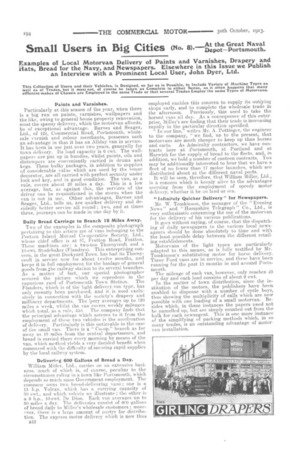Small Users in Big Cities (No. 8).
Page 6

If you've noticed an error in this article please click here to report it so we can fix it.
Paints and Varnishes.
• Particularly at this season of the year, when there is a big run on paints, varnishes, wallpapers and the like, owing to general house property renovation, must the speedy delivery, which the motorvan affords, be of exceptional advantage. Barnes and Seeger, Ltd., of 121, Commercial Road, Portsmouth, wholesale varnish and colour merchants, possesses such an advantage in that it has an Allday van in service. It has been in use just over two years, generally for town delivery. Its load capacity is 6 cwt. The wallpapers. are put up in bundles, whilst paints, oils and distempers are conveniently carried in drums and kegs. These bulky packages, in addition to supplies of considerable value which are used by the house decorator, are all carried with perfect security under lock and key, and in good condition. The van, as a rule, covers about 20 miles a day_ This is a low average, but, as against this, the services of the driver can be requisitioned in the stores when the van is not in use. Other advantages, Barnes and Seeger, Ltd., tells us, are quicker delivery and decidedly better service all round ; two, and at times three, journeys can be made in one day by it.
Daily Bread Carriage to Branch 18 Miles Away.
Two of the examples in the composite photograph pertaining to this article are of vans belonging to the Portsea island Mutual Co-operative Society, Ltd., whose chief office is at 87, Fratton Road, Fratton. These machines are : a two-ton Thornycroft and a 10-cwt. Studebaker (Flanders). This enterprising concern, in the great Dockyard Town, has had its Thornycroft in service now for about twelve months, and keeps it in full employment for the haulage of general goods from ,he railway station to its several branches. As a matter of fact, our special photographer secured the picture which we reproduce in the capacious yard of Portsmouth Town Station. The Flanders, which is of the light delivery-van type, has only recently been purchased, and it. is used exclusively in connection with the society's drapery and millinery departments. The lprry averages up to 120 miles a week, whilst the van covers weekly mileages which total, as a rule, 450. The company finds that the principal advantage which accrues to it from the employment of these two vehicles is the acceleration of delivery. Particularly is this noticeable in the ease of the email van. There is a " Co-op." branch as far away as 18 miles from the central departments, and bread is carried there every morning by means of the van, which method yields a very decided benefit when comnared with the difficulty of securing rapid supplies by the local railway system.
Delivering 600 Gallons of Bread a Day.
William Miller, Ltd., carries on an extensive business, much of which is, of course, peculiar to the circumstances ruling in a• town like Portsmouth, which depends so much upon Government employment. The company owns two bread-delivering vans ; one is a 15 h.p. Vulcan, which has a carrying capacity of 30 cwt., and which vehicle we illustrate ; the other is a 9 lep., 10-cwt. De Dion. Each van averages up to 50 miles a clay. The deliveries consist of 6C0 gallons of bread daily to Miller's wholesale customers : moreover, there is a large amount of pastry for distribution. The express motor delivery which is now thus
el0 employed enables this concern to supply its outlying shops early, and to complete the wholesale trade in the afternoon. Previously, this used to take the horsed vans all day. As a consequence of this enterprise, Miller's are .A.nding that their trade is increasing rapidly in the particular direction specified. In our line," writes Mr. A. Pottinger, the engineer to the company, " we find, up to the present, that motorvans are much cheaper to keep up than horses and carts. As Admiralty contractors, we have contracts here at Portsmouth, at Portland and at Harwich for the supply of bread to the fleets, and, in addition, we hold a number of canteen contracts. You may be additionally interested to hear that we have a fleet of no fewer than 17 motor launches, which are distributed about at the different naval ports. It will be seen, therefore. that William Miller, Ltd., is a concern which is keenly alive to the advantages accruing from the employment of speedy motor delivery, whether it be on land or sea.
"Infinitely Quicker Delivery" for Newspapers.
Mr. W. Tomkineon, the manager of the "Evening sews" and "Hampshire Telegraph" Co., Ltd., i.4 very enthusiastic concerning the use of the rnotorvan for the delivery of his various publications. It goes without saying, of course, that the dispatching of daily newspapers to the various local newsagents should be done absolutely to time and with the least possible delay between the different retailing establishments. Motorvans of the light types are particularly adapted to this means, as is fully testified by Mr. Tomkinson's substituting motor for horse delivery. Three Ford vans are in service, and these have been running for the past 18 months in and around Portsmouth.
The mileage of each van, however, only reaches 40 per day and each load consists of about 9 cwt.
In the matter of town distribution, since the institution of the motors, the publishers have been enabled to dispense with a number of cycle boys, thus showing the multiplicity of calls which are now possible with one loading of a small motorvan. Besides which, in these instances the papers need not be parcelled up, but are simply counted out from the bulk for each newsagent. This is one more instance of the simplifying of packing methods which, in so many trades, is an outstanding advantage of motorvan installation.






















